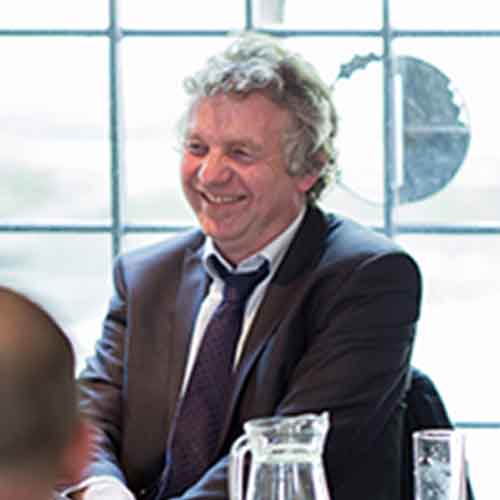An interview with Dave Liddell

by Hannah Hale
Dave leads the Scottish Drugs Forum (SDF) team and reports directly to SDF’s Board of Directors. Or he did at the time I interviewed him. After 36 years in this role, he has now retired. Dave worked for SDF since its inception in 1986 and in the field of drugs, homelessness and alcohol. A few of us at DRNS put our heads together to think about what would be useful to ask him. Speaking with him just prior to his retirement felt timely. He has a wealth of knowledge and experience in the field and his insights uniquely span the sectors.
How did you come into the role in SDF?
I did a degree in Chemistry, so I worked as a Biochemist for a couple of years. And then decided that actually I didn’t want to be a Chemist. So, then I went into other Social Care work and I worked with Irish Travellers in Dublin: young Travellers who were glue sniffing and often sleeping rough. This was in the early 80s. The project was funded by Government, with the Government’s goal being to basically get the young Travellers off the streets and to stop them robbing tourists. Then I did a postgrad diploma in social work in Edinburgh from 1982 to 1984. But at the end of that I was put off being a social worker. I was looking for an alternative role to social work and I got a job doing drugs research in Edinburgh in 1985. From that moment on I was fully engaged in this area of work and felt I could make a positive contribution, even though much of it was hugely challenging. I did that work alongside Sally Haw who’s a semi-retired professor from Stirling. We were working for the Standing Conference on Drug Abuse (which became Drugscope) and the idea was to set up a similar organisation to theirs in Scotland and that’s where the Scottish Drugs Forum came from.
How did your training in practice prepare you for your role in SDF?
Having that frontline experience I think is just invaluable: to understand that projects don’t always run to plan gave me a sense of the challenges of front-line delivery. I wouldn’t want to criticise policymakers too much, but the challenge is often that that policymakers have never worked in frontline services. As a result, it is difficult for them to understand how policy gets translated into frontline practice. And what we have sadly done over the years is lost some of that closeness with the client group in terms of, if you like, the therapeutic relationship. This has been through developing very big, particularly NHS, bureaucratic services. And one of the huge frustrations is the big levels of bureaucracy around the implementation of strategy. So, you’ve got so many people now within Government and within Public Health Scotland. You almost can’t see the wood for the trees.
What changes have you seen in terms of policy and practice?
I think the interesting bit in terms of policy has been that we started off in the very beginning… I suppose I’m talking ’85, ’86, with services that were very much abstinence-focused. And then you had the HIV epidemic in Edinburgh and Dundee and that shifted things straight away. So you had the ACMD report in 1988, which talked about HIV being a greater threat to public health than drug use, per se. There was a big shift at that point towards harm reduction as an approach. Then there were the Blair years that focused very much on crime reduction which the then Scottish Executive closely followed. The whole focus more recently has been on drug-related deaths and a move very much back towards a harm reduction approach, although within that we’ve seen significant investment in residential rehabilitation. I suppose we’ve never had an evidence-led strategy. We’ve had evidence informed, which is probably as good as it’s got. And sometimes, like with the Road to Recovery Strategy in 2008, we looked for the evidence after producing the strategy. So, I think this is a real problem in this area in that policy is too often led by morality rather than evidence.
Thoughts on evidence-based research: ideals and the present situation
Ideally, we would have all the evidence we need to progress an evidence-based policy and in many respects we do. For example, there is a huge international evidence base around drug consumption rooms and also Heroin Assisted Treatment. But rather than roll out these programmes out across Scotland, we feel the need to have specific Scottish evidence. So, programmes such as Heroin Assisted Treatment are developed as pilots. Of course, we do need Scottish evidence, but in a public health emergency we have too often delayed swift action.
It’s hugely frustrating that we don’t use the evidence base appropriately because of the fear of public opinion. And another example is the issue around the therapeutic relationship being key to positive outcomes for individuals and yet we don’t put services in place that actually enable those therapeutic relationships to become established. Often, the mantra from folk we’ve interviewed through the peer research is that they go along and they get seen by a different person on four or five visits and they have to tell their story again and again. So, what we are doing in services too often is re-traumatising people when they have to re-tell their story. It’s reinforcing people’s view of themselves as not being valued or of any worth.
What strategies has SDF used to bridge divisions between politicians, practitioners, academics, and people who use drugs?
We have always seen our role as bridging the gap between those in need of services and those making the decisions regarding policy and service provision. We pioneered peer research over 20 years ago when it was hugely controversial to take account of the views of active users. Thankfully this has now changed, and peer research has been mainstreamed. However, it remains the case that Scotland is one of the few European countries without active drug user advocacy groups. We are seeking to change this through our living experience project. We persuaded the Drugs Minister at the time, Angela Constance, that there was an imbalance between lived and living experience voices and that this should be addressed by setting up freestanding drug user groups across Scotland. We have developed nine groups so far with excellent attendance and engagement. The intention is for there to be no agenda. We are bringing people together. They can talk about whatever they want to talk about and progress whatever they want to. The demand for that is quite significant from folk. Often for people this is almost the first time they’ve been able to talk about their issues in a way that they don’t feel judged and feel valued.
How does Scotland differ to other first world countries in terms of work that has been done to better enable people who use drugs to have a voice?
Most countries across Europe have active user networks and Canada does too. And you have to ask yourself, why have we not had that? I think to some extent, our population is so marginalised and struggling in many respects to stay alive. And actually to form groups that campaign for change to services is beyond folks. So, I think we need to do an awful lot of work to support that to happen. The drug problem that we have in Scotland is, and always has been, linked to poverty and deprivation and now is overlaid by significant trauma. It makes it very hard to make a long-term impact. Drug policy in itself can’t solve all of these problems. It’s a wider societal problem that needs addressed more widely and we do ourselves a disservice if we don’t acknowledge that it’s just a part of the wider problem.
Thoughts on the direction drugs research has taken since 2016 and gaps in the research.
The research community has to take maybe a bit more responsibility in terms of not just looking for more evidence and rather acknowledging we’re in an absolute crisis here. People are dying in massive numbers. We need to respond now. Evidence is vital but I think there’s a balance to be struck around all of that. For example, the Heroin Assisted Treatment programme in Glasgow: the numbers are really small, and yet we spent a massive amount of money on gathering the evidence. The approach instead could have been: we’ve got the evidence already from across other jurisdictions, let’s roll out a programme of Heroin Assisted Treatment. And similarly with the drug consumption room if it ever comes in, it will probably be researched extensively, when we actually have a lot of international evidence of drug consumption rooms. And would it not be better to use them as evidence and roll them out as part of the drugs death strategy?
Can you tell us about the approach you take to reconciling an advocacy role alongside working closely with Scottish Government?
We’re now substantially funded by Government. My view is that we have always been a critical friend of Government. It changes over time. There have been periods where we have been quite removed and periods where our membership is criticising us for being too far away from Government and then for being too close. But I would like to think we have navigated that pretty well over the years. But of course, it’s a challenge. What Government needs to realise is the benefit of a critical friend. So that when we do provide support, it’s more credible. Because there are actually some times when we criticise them as well. It’s not like SDF is a cheerleader for Government.
Drugs research has a tendency to work with people who have retrospectively used drugs. A big gap remains in the field, whereby more research is needed where participants comprise people who currently use drugs. What are your thoughts on this gap and how it can be addressed?
It’s been quite interesting that we have been criticised for using volunteers as peer researchers, for example. And it’s not that we are against paying people. I think that should happen as well. But the argument for us is that we can recruit people who are not at the point of being able to hold down a job. For example, for the baseline study for the MAT Standards, we interviewed over 100 people. And 75% of those interviews were conducted by people on OST themselves. And that feeds into the question of who is a peer? If you have someone who is in long term recovery, interviewing someone who is on OST, then they might feel judged by that person as well.
Interestingly, since 2004, we have had an Addiction Worker Training Programme for people with a history of substance use problems to train as workers and when we set that up, we had to negotiate with local services for placements. And at that point, we put a two-year drug-free limit for who can apply. Now we have done away with it because services are more content to take on people on OSTs as well. So, there are things that are shifting in terms of that.
Drug death figures have begun to fall but it’s obviously too soon to say that’s a trend. That’s a hugely positive thing that they’re starting to go down, but a concern has to be that it will become less of a political issue for Government and the opposition parties, and it will then become a challenge to hang onto the levels of funding we have over recent years which are crucial to making a real impact on the problem.
Dave Liddell was a founding member of DRNS and a member of the Steering Committee. We’re grateful to Dave for giving us the time to be interviewed and wish him a very well earned and enjoyable retirement.





